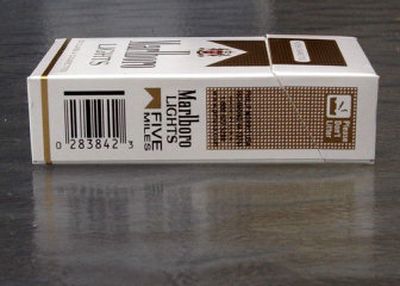‘Light’ suit can proceed

NEW YORK – It’s a lawsuit a federal judge calls “vexing” and compares to a pointillist painting: tens of millions of light cigarette smokers seeking up to $200 billion in damages from tobacco companies.
But in a blow to Big Tobacco, U.S. District Judge Jack Weinstein ruled Monday that the case should go to trial next year as a class-action.
“Plaintiffs’ proof is akin to a pointillist painting by Georges Seurat,” Weinstein wrote in the 540-page ruling. “When a juror stands back from the canvas and looks at the big picture, he or she may well discern clearly enough an industry based on fraud and coverup that has taken more than half a century to begin to admit its subtle lies to the public designed to sell its product.”
The suit – filed in 2004 against Philip Morris USA Inc., R.J. Reynolds Tobacco Co., Lorillard Tobacco Co. and other cigarette manufacturers – alleges the tobacco companies responded to consumers’ mounting health concerns with a marketing scheme to promote light cigarettes as a lower-risk alternative to regular cigarettes, even though their own internal documents showed they knew the risks were about the same.
Monday’s ruling pressed Altria Group Inc., which owns Phillip Morris, into delaying a much-anticipated restructuring plan that includes the divestiture of its controlling stake in Kraft Foods Inc., maker of Oreo cookies, Ritz crackers and Jell-O brands. The sale of Kraft had seemed to edge nearer after recent legal rulings seen as favorable to tobacco companies.
In a conference call Monday afternoon, William S. Ohlemeyer, associate general counsel for Philip Morris USA, said a prerequisite to pursuing the restructuring plan is clarity in the overall litigation environment.
“Today’s decision is not a step toward clarity. It is a step back of sorts,” he said.
Smokers’ attorney Michael D. Hausfeld said the decision could clear the way for one of the largest class-action cases ever, both in number of plaintiffs and amount of damages. He estimated the class – consisting of anyone who purchased cigarettes that were labeled “light” or “lights” after they were put on the market in the early 1970s – could number 60 million.
“It’s an extremely significant ruling,” he said.
Lawyers for the tobacco companies said they would appeal.
“We obviously disagree with the ruling – strongly,” said Theodore Grossman, an attorney for R.J. Reynolds. “The law doesn’t support class certification.”
Ohlemeyer said in a statement that manufacturers would “seek a stay of all trial court proceedings pending a decision by the appellate court.”
Last year, the U.S. 2nd Circuit Court of Appeals threw out Weinstein’s decision in a 2002 case in which he certified the first-ever, nationwide class-action against tobacco companies. The panel ruled he had stretched the boundaries of the law by allowing the plaintiffs to seek only punitive damages.
In Monday’s ruling, Weinstein said the class certification was necessary because “no individual can afford to prosecute the case alone.” Any flaws in the case, he added, were outweighed by the need to put it before a jury.
“The case comes down to the role of the jury: Should it be permitted to decide a vexing private litigation on the basis of somewhat dubious arguments and questionable proofs when the decision has so many important overtones, or should the judges themselves decide by holding that the matter is beyond the ken of a reasonable jury?” he wrote. “Here, the fundamentals of the constitution provide the answer.”
An analysis by plaintiffs’ expert witnesses concluded more than 90 percent of the smokers in the potential class purchased light cigarettes over the past three decades based on health concerns, as opposed to taste or other factors.